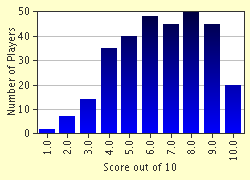Quiz Answer Key and Fun Facts
1. What does the saying "Nero fiddled while Rome burned" refer to?
2. How many plays by Shakespeare were based on Roman leaders/rulers?
3. There were four types of gladiator, one was a Bestiarius who fought animals. But which of the following four was NOT a type of gladiator?
4. Who was the blacksmith among Roman gods?
5. Which Roman god had two faces?
6. How did Horatius save Rome?
7. What was a cohort?
8. How were Roman soldiers paid?
9. What was the 'Pax Romana'?
10. What was unique about Santa Sophia?
Source: Author
doomed
This quiz was reviewed by FunTrivia editor
bloomsby before going online.
Any errors found in FunTrivia content are routinely corrected through our feedback system.

